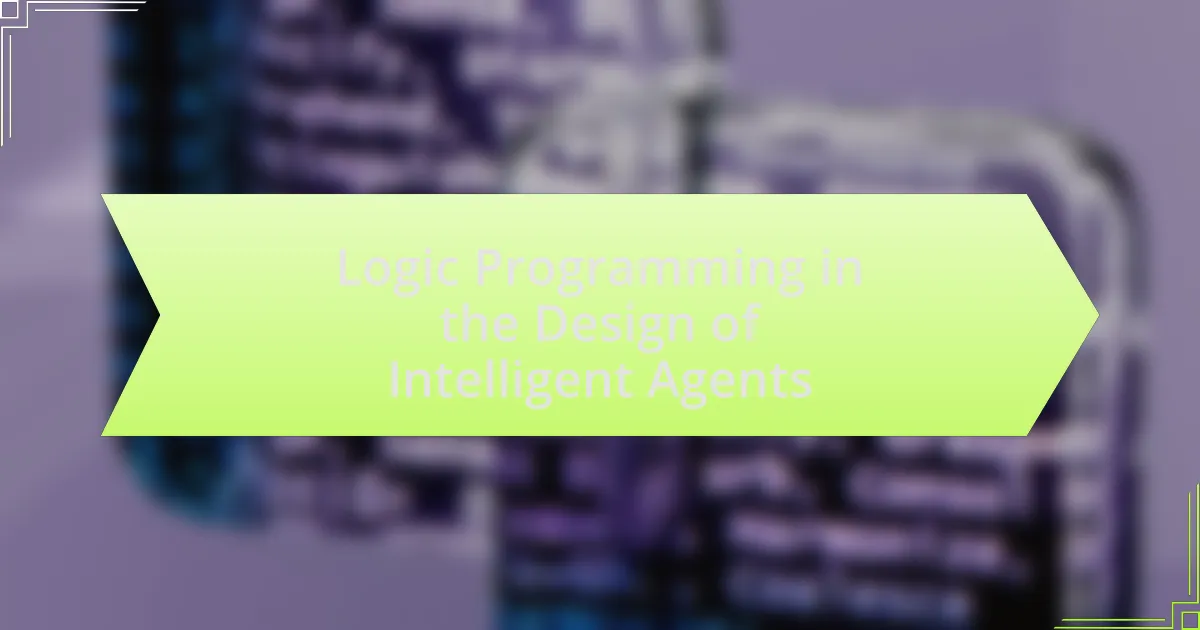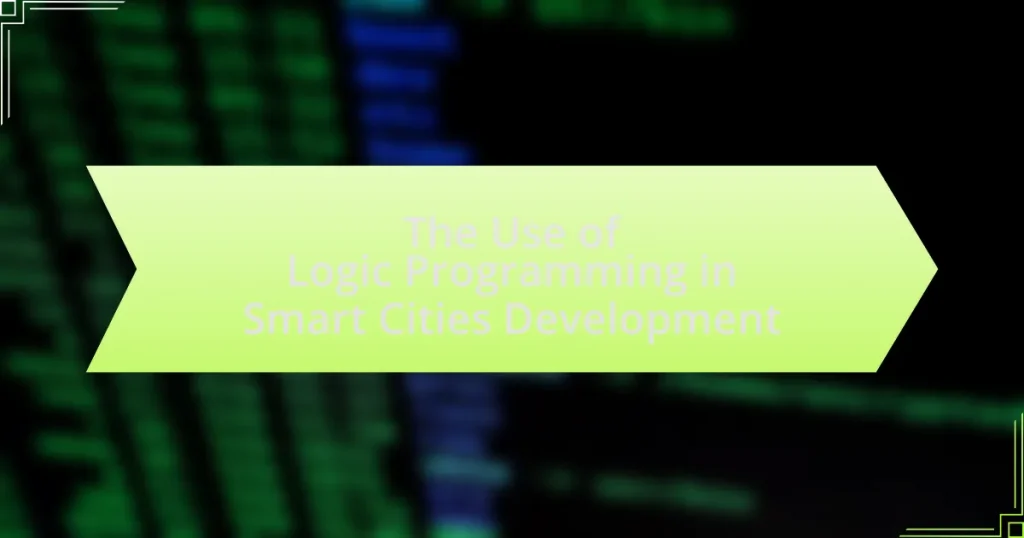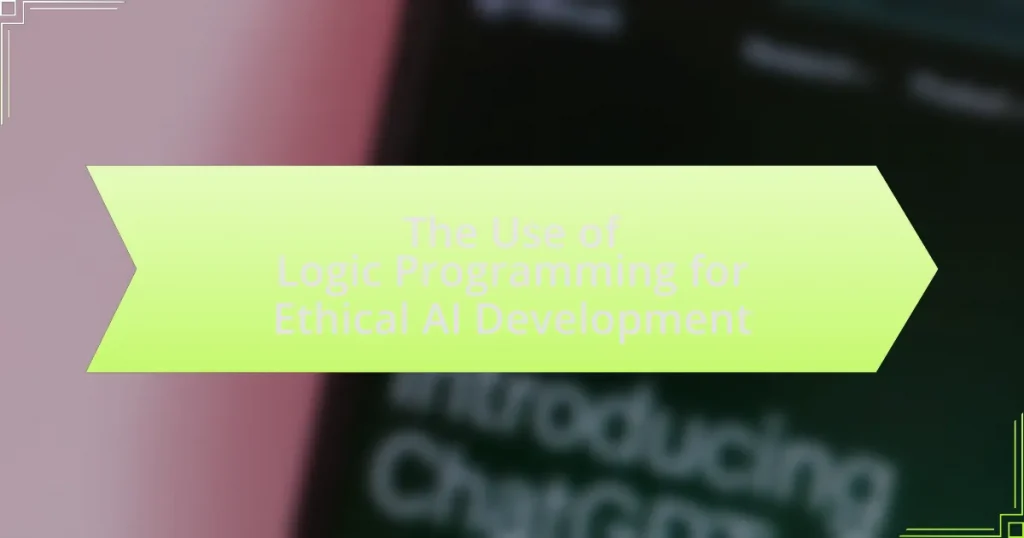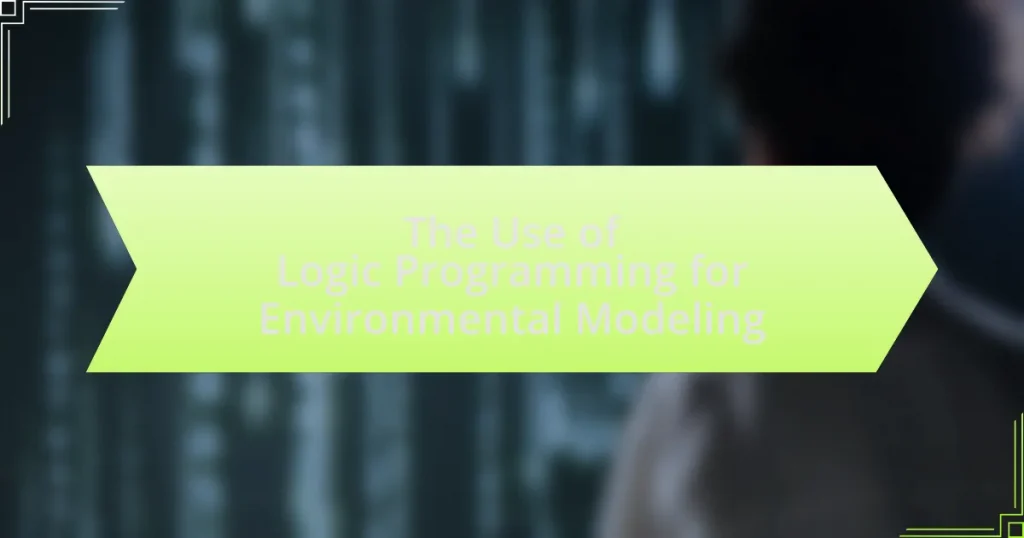Logic programming is a programming paradigm that utilizes formal logic to design intelligent agents, enabling them to represent knowledge and reason effectively. This article explores the contributions of logic programming to intelligent agent design, highlighting its principles, key components, and applications across various domains such as natural language processing and robotics. It also addresses the challenges faced in logic programming, including scalability and expressiveness, while discussing best practices for implementation and future trends, particularly the integration of machine learning techniques. The article provides a comprehensive overview of how logic programming enhances the reasoning capabilities and adaptability of intelligent agents, making it a vital area of study in artificial intelligence.
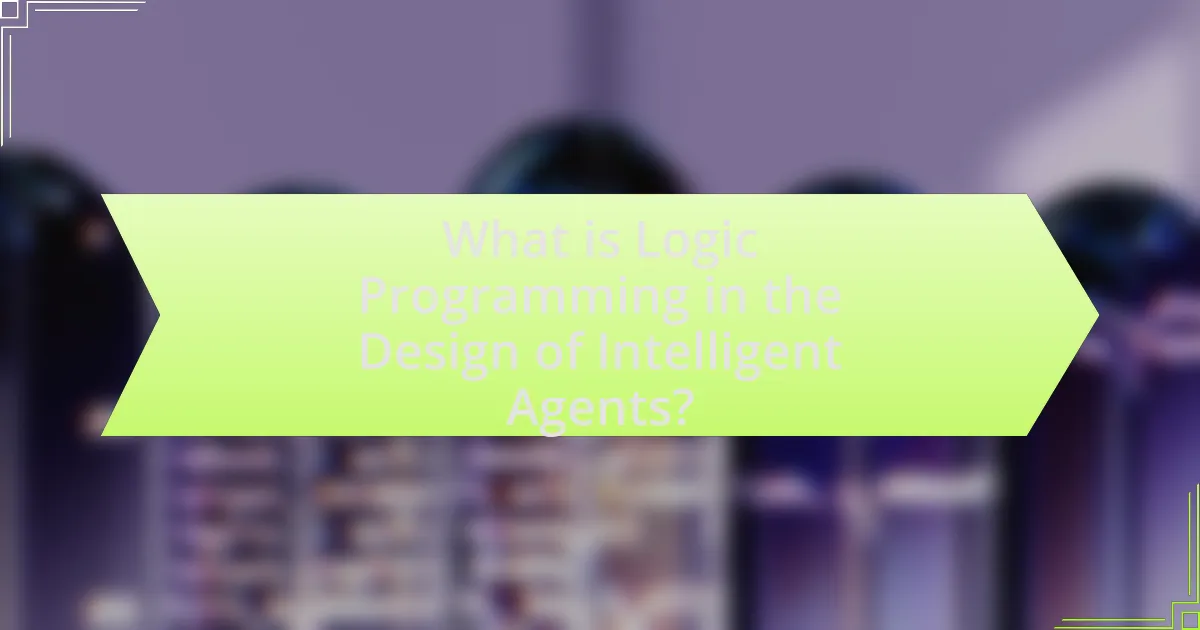
What is Logic Programming in the Design of Intelligent Agents?
Logic programming in the design of intelligent agents is a programming paradigm that uses formal logic to represent knowledge and reason about it. This approach allows intelligent agents to derive conclusions from a set of facts and rules, enabling them to make decisions based on logical inference. Logic programming languages, such as Prolog, facilitate this process by providing a framework for defining relationships and rules that govern agent behavior. The effectiveness of logic programming in intelligent agent design is evidenced by its application in various domains, including natural language processing and automated reasoning, where agents can solve complex problems by manipulating logical statements.
How does Logic Programming contribute to Intelligent Agent design?
Logic programming significantly contributes to intelligent agent design by providing a formal framework for knowledge representation and reasoning. This framework allows agents to infer new information from existing knowledge through logical rules and facts, enabling them to make decisions based on complex scenarios. For instance, Prolog, a prominent logic programming language, facilitates the development of agents that can solve problems by querying databases and applying logical deductions. The ability to express knowledge in a declarative manner enhances the flexibility and adaptability of intelligent agents, making them capable of handling dynamic environments effectively.
What are the fundamental principles of Logic Programming?
The fundamental principles of Logic Programming include the use of formal logic as a programming paradigm, the representation of knowledge through facts and rules, and the execution of programs via a process of logical inference. Logic Programming is based on the idea that programs can be expressed as a set of logical statements, where the computation is performed by deriving conclusions from these statements using a process called resolution. This approach allows for declarative programming, where the focus is on what the program should accomplish rather than how to achieve it. The validity of these principles is supported by the success of languages like Prolog, which utilize these concepts to solve complex problems in artificial intelligence and knowledge representation.
How does Logic Programming differ from other programming paradigms?
Logic programming differs from other programming paradigms primarily in its use of formal logic to express computations. In logic programming, programs consist of a set of sentences in logical form, which describe relationships and rules, allowing the system to derive conclusions through inference. This contrasts with imperative programming, where commands are executed in a specific sequence, and object-oriented programming, which focuses on encapsulating data and behavior within objects. The declarative nature of logic programming enables a higher level of abstraction, allowing developers to specify what the program should accomplish rather than how to achieve it, which is a fundamental shift from the procedural approach seen in other paradigms.
What are the key components of Intelligent Agents?
The key components of Intelligent Agents are perception, reasoning, and action. Perception involves the agent’s ability to gather information from its environment through sensors. Reasoning refers to the agent’s capability to process this information, often using logic and decision-making algorithms, to determine the best course of action. Action is the execution of decisions made by the agent, typically through actuators that interact with the environment. These components work together to enable Intelligent Agents to operate autonomously and effectively in various contexts.
What roles do perception and action play in Intelligent Agents?
Perception and action are fundamental components of Intelligent Agents, as they enable these systems to interact with their environment effectively. Perception involves the acquisition and interpretation of sensory information, allowing agents to understand their surroundings and make informed decisions. For instance, an Intelligent Agent equipped with visual sensors can identify obstacles and navigate through a space. Action refers to the execution of decisions made based on perceived information, which can include moving, communicating, or manipulating objects. The interplay between perception and action is crucial; accurate perception leads to appropriate actions, thereby enhancing the agent’s ability to achieve its goals. This relationship is supported by research in robotics and artificial intelligence, which demonstrates that agents with robust perception systems perform better in dynamic environments.
How do reasoning and decision-making processes function in Intelligent Agents?
Reasoning and decision-making processes in Intelligent Agents function through the application of logical frameworks and algorithms that enable them to analyze information, draw conclusions, and make choices based on predefined criteria. Intelligent Agents utilize techniques such as rule-based reasoning, where they apply logical rules to a set of facts to infer new information, and probabilistic reasoning, which allows them to make decisions under uncertainty by evaluating the likelihood of various outcomes.
For example, in a rule-based system, an Intelligent Agent might use a set of “if-then” rules to determine the best course of action based on the current state of its environment. In contrast, probabilistic reasoning involves algorithms like Bayesian networks, which help agents assess the probability of different scenarios and choose actions that maximize expected utility. These reasoning processes are essential for tasks such as planning, problem-solving, and adapting to dynamic environments, thereby enhancing the agent’s effectiveness in real-world applications.
What challenges are faced in Logic Programming for Intelligent Agents?
Logic programming for intelligent agents faces several challenges, including scalability, expressiveness, and integration with other paradigms. Scalability issues arise as the complexity of the problem domain increases, making it difficult for logic-based systems to handle large datasets efficiently. Expressiveness challenges occur when the logic programming language lacks the necessary constructs to represent certain types of knowledge or reasoning, limiting the agent’s capabilities. Additionally, integrating logic programming with other programming paradigms, such as procedural or object-oriented programming, can complicate the development process and hinder performance. These challenges are well-documented in the literature, highlighting the need for ongoing research and development in the field.
How do scalability issues affect Logic Programming applications?
Scalability issues significantly hinder the performance and efficiency of Logic Programming applications. As the size of the knowledge base or the complexity of the queries increases, the computational resources required for inference and reasoning also escalate, leading to longer processing times and potential system failures. For instance, Prolog, a widely used Logic Programming language, can experience exponential growth in execution time when handling large datasets or complex logical relationships, as evidenced by studies showing that query performance can degrade drastically with increased data volume. This limitation restricts the applicability of Logic Programming in real-time intelligent agent systems, where quick decision-making is crucial.
What limitations exist in current Logic Programming techniques?
Current Logic Programming techniques face several limitations, including scalability issues, difficulty in handling uncertainty, and performance inefficiencies. Scalability challenges arise as the complexity of problems increases, leading to longer computation times and resource consumption. Additionally, traditional Logic Programming lacks robust mechanisms for managing uncertain or incomplete information, which is often crucial in real-world applications. Performance inefficiencies are evident when dealing with large datasets or complex queries, as the execution speed can significantly decrease, hindering practical usability. These limitations highlight the need for advancements in Logic Programming to enhance its applicability in designing intelligent agents.
How can Logic Programming be effectively implemented in Intelligent Agents?
Logic programming can be effectively implemented in intelligent agents by utilizing its declarative nature to represent knowledge and reason about it. This approach allows agents to derive conclusions from a set of facts and rules, enabling them to make informed decisions based on logical inference. For instance, Prolog, a prominent logic programming language, facilitates the creation of agents that can solve complex problems through backtracking and unification, which are essential for handling dynamic environments. Empirical studies, such as those conducted by Kambhampati et al. (2009) in “Planning as Satisfiability,” demonstrate that logic programming enhances the problem-solving capabilities of intelligent agents by providing a structured framework for reasoning and knowledge representation.
What are the best practices for using Logic Programming in agent design?
The best practices for using Logic Programming in agent design include ensuring clarity in the representation of knowledge, utilizing modular design for scalability, and implementing efficient inference mechanisms. Clarity in knowledge representation allows agents to reason effectively and reduces ambiguity, which is crucial for decision-making. Modular design facilitates the integration of new knowledge and functionalities, making the agent adaptable to changing environments. Efficient inference mechanisms, such as using Prolog’s backtracking or constraint logic programming, enhance the agent’s performance by optimizing the reasoning process. These practices are supported by the success of Logic Programming in various applications, such as automated theorem proving and natural language processing, demonstrating its effectiveness in creating intelligent agents.
How can developers troubleshoot common issues in Logic Programming?
Developers can troubleshoot common issues in Logic Programming by systematically analyzing the code, verifying logical consistency, and utilizing debugging tools. Analyzing the code involves checking for syntax errors and ensuring that predicates and rules are correctly defined. Verifying logical consistency requires testing the logic against expected outcomes to identify discrepancies. Additionally, debugging tools specific to Logic Programming environments, such as trace and debug commands, can help developers step through the execution of the program to pinpoint where the logic fails. These methods are effective as they allow for a structured approach to identifying and resolving issues, ensuring that the logic adheres to the intended design and functionality.
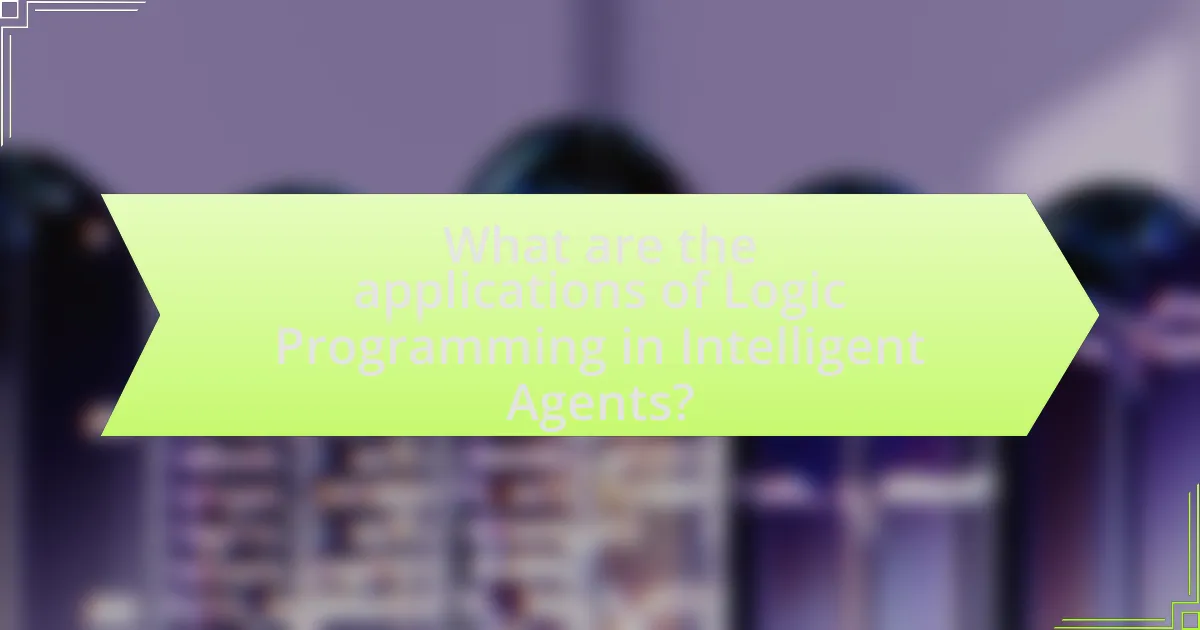
What are the applications of Logic Programming in Intelligent Agents?
Logic programming is applied in intelligent agents primarily for knowledge representation, reasoning, and problem-solving. Intelligent agents utilize logic programming to represent complex knowledge in a structured format, enabling them to infer new information and make decisions based on existing data. For instance, Prolog, a logic programming language, allows agents to express facts and rules, facilitating automated reasoning processes. This capability is essential in applications such as natural language processing, where agents interpret and respond to human language, and in automated planning, where agents generate sequences of actions to achieve specific goals. The effectiveness of logic programming in these contexts is evidenced by its widespread use in AI systems, including expert systems and robotics, where logical reasoning is crucial for functioning in dynamic environments.
In which domains are Intelligent Agents utilizing Logic Programming?
Intelligent agents utilize logic programming in domains such as artificial intelligence, natural language processing, automated reasoning, and knowledge representation. In artificial intelligence, logic programming facilitates the development of systems that can reason and make decisions based on a set of rules and facts. In natural language processing, it aids in understanding and generating human language by providing a structured framework for semantic interpretation. Automated reasoning benefits from logic programming by enabling agents to derive conclusions from known information, while knowledge representation allows for the organization and manipulation of complex data in a way that is interpretable by machines. These applications demonstrate the versatility and effectiveness of logic programming in enhancing the capabilities of intelligent agents.
How is Logic Programming applied in robotics?
Logic programming is applied in robotics primarily for knowledge representation and reasoning, enabling robots to make decisions based on logical inference. This approach allows robots to process complex information and execute tasks by defining rules and relationships within a logical framework. For instance, Prolog, a common logic programming language, is utilized in robotic systems for tasks such as planning, natural language processing, and problem-solving. Research has shown that logic programming enhances the ability of robots to operate in dynamic environments by allowing them to adapt their actions based on new information, as evidenced by applications in autonomous navigation and multi-agent systems.
What role does Logic Programming play in natural language processing?
Logic programming plays a crucial role in natural language processing (NLP) by providing a formal framework for representing and reasoning about linguistic knowledge. This approach allows for the creation of systems that can understand and generate human language through logical inference. For instance, Prolog, a prominent logic programming language, enables the implementation of grammar rules and semantic representations that facilitate parsing and interpretation of sentences. Research has shown that logic-based models can effectively handle ambiguities and complexities in language, making them valuable for tasks such as machine translation and question answering.
What are the benefits of using Logic Programming in Intelligent Agents?
The benefits of using Logic Programming in Intelligent Agents include enhanced reasoning capabilities, declarative problem-solving, and improved knowledge representation. Logic Programming allows agents to derive conclusions from a set of facts and rules, enabling them to make informed decisions based on logical inference. This approach facilitates the representation of complex relationships and constraints in a clear and structured manner, which is essential for tasks such as planning and decision-making. Additionally, Logic Programming languages, like Prolog, support backtracking and unification, which streamline the process of finding solutions to problems. These features contribute to the development of more efficient and effective intelligent agents capable of handling dynamic environments and complex tasks.
How does Logic Programming enhance the reasoning capabilities of agents?
Logic Programming enhances the reasoning capabilities of agents by providing a formal framework for representing knowledge and deriving conclusions through logical inference. This framework allows agents to process complex queries and make decisions based on a set of rules and facts. For instance, Prolog, a prominent logic programming language, enables agents to utilize backtracking and unification to explore possible solutions efficiently. The ability to express knowledge in a declarative manner allows agents to focus on what to solve rather than how to solve it, leading to more effective reasoning. Additionally, the use of logical operators and predicates facilitates the representation of relationships and constraints, which are crucial for intelligent decision-making.
What advantages does Logic Programming offer in terms of flexibility and adaptability?
Logic Programming offers significant advantages in flexibility and adaptability by allowing dynamic modification of rules and facts without altering the underlying code structure. This capability enables developers to easily adjust the behavior of intelligent agents in response to changing requirements or environments. For instance, in Prolog, new rules can be added or existing ones modified at runtime, facilitating rapid prototyping and iterative development. This adaptability is crucial in applications such as natural language processing and automated reasoning, where the ability to incorporate new knowledge or adjust to user interactions enhances the system’s effectiveness and responsiveness.

What future trends are emerging in Logic Programming for Intelligent Agents?
Future trends in Logic Programming for Intelligent Agents include increased integration with machine learning techniques, enhanced support for multi-agent systems, and the development of more expressive and flexible programming languages. The integration with machine learning allows agents to learn from data and improve their decision-making capabilities, as evidenced by research showing that combining logic programming with neural networks can enhance reasoning tasks. Enhanced support for multi-agent systems is driven by the need for collaborative problem-solving, with frameworks like AgentSpeak and Jason facilitating complex interactions among agents. Additionally, the evolution of programming languages, such as the emergence of Answer Set Programming (ASP), provides more powerful tools for representing knowledge and reasoning, which is crucial for the advancement of intelligent agents.
How is the integration of machine learning influencing Logic Programming?
The integration of machine learning is significantly enhancing Logic Programming by enabling systems to learn from data and improve their reasoning capabilities. This synergy allows Logic Programming to incorporate probabilistic reasoning and adapt to new information, which traditional logic systems struggle with. For instance, machine learning techniques such as neural networks can be used to refine the rules and predicates in Logic Programming, leading to more robust and flexible intelligent agents. Research has shown that combining these approaches can yield better performance in tasks like natural language understanding and decision-making, as evidenced by studies like “Combining Logic Programming and Machine Learning” by Muggleton and De Raedt, which highlights successful applications in various domains.
What advancements are being made in hybrid approaches combining Logic Programming and other techniques?
Advancements in hybrid approaches combining Logic Programming with other techniques include the integration of machine learning and constraint satisfaction, enhancing the reasoning capabilities of intelligent agents. For instance, recent research has demonstrated that combining Logic Programming with neural networks allows for improved decision-making processes in uncertain environments, as seen in the work by De Raedt et al. (2020) in “Neural Symbolic Learning and Reasoning.” This integration enables agents to learn from data while maintaining logical reasoning, thus improving their adaptability and performance in complex tasks. Additionally, the use of Logic Programming in conjunction with probabilistic reasoning frameworks has led to more robust models that can handle incomplete information, as highlighted in the study by Kimmig et al. (2012) in “Learning Probabilistic Logic Programs.” These advancements illustrate the growing trend of leveraging the strengths of Logic Programming alongside other computational techniques to create more effective intelligent agents.
What practical tips can be applied when designing Intelligent Agents with Logic Programming?
When designing Intelligent Agents with Logic Programming, it is essential to focus on modularity, clarity, and efficiency. Modularity allows for the separation of different functionalities into distinct components, making the system easier to manage and update. Clarity in the logic rules ensures that the reasoning process is transparent and understandable, which is crucial for debugging and maintenance. Efficiency can be achieved by optimizing the logic queries and using appropriate data structures to minimize computational overhead. These practices are supported by the principles of software engineering and computational logic, which emphasize the importance of structured and efficient code in developing robust intelligent systems.
How can developers ensure the maintainability of Logic Programming code in agent systems?
Developers can ensure the maintainability of Logic Programming code in agent systems by adhering to best practices such as modular design, clear documentation, and rigorous testing. Modular design allows for separation of concerns, making it easier to update or replace components without affecting the entire system. Clear documentation provides context and usage guidelines, which facilitate understanding and collaboration among developers. Rigorous testing, including unit tests and integration tests, helps identify issues early and ensures that changes do not introduce new bugs. These practices are supported by research indicating that well-structured code and thorough documentation significantly reduce maintenance costs and improve long-term sustainability in software projects.
What resources are available for learning more about Logic Programming in Intelligent Agents?
Books such as “Logic Programming for Artificial Intelligence” by Robert Kowalski and “Artificial Intelligence: A Modern Approach” by Stuart Russell and Peter Norvig provide foundational knowledge on logic programming in intelligent agents. Online courses from platforms like Coursera and edX offer structured learning paths, including courses specifically focused on logic programming and AI. Additionally, research papers, such as “Logic Programming in AI” by Michael Gelfond and Vladimir Lifschitz, published in the “Artificial Intelligence” journal, present advanced concepts and applications of logic programming in intelligent agents. These resources collectively cover theoretical and practical aspects, making them valuable for learners at various levels.
